Posted on : Nov.10,2006 14:03 KST
Modified on : Nov.10,2006 14:12 KST
Hong Sae-hwa, public editor
The whole country is up in arms about skyrocketing housing costs. Ours is a society where you’re stuck paying monthly rent your whole life unless you’ve got parents to help you out. A young person is going to earn only about as much as 30 million won (US$31,000) if he’s successful on the job front, and only after he or she survives a savage education system. The same society promises the same savagery with housing prices that rise 50 or 100 million won in a single day.
Every news outlet in the country is engaged in an all-out attack on the Participatory Government’s real estate policy. The Hankyoreh’s voice in this is a healthy one. It has chronicled one individual that owns as many as 819 homes and another that owns 1,083. But The Hankyoreh does not intensively push the question of whether the values of the public good can supercede private property rights, which have long been worshipped in South Korea. Am I the only one who has failed to feel a certain intensity about the real estate situation from The Hankyoreh? Where there is no intensity, there is no vision, and when there is no vision, there is a risk of defeatism.
It is in expressions like "The Republic of Samsung," "The Republic of Gambling," and "The Republic of Corruption" (I would hope that at least The Hankyoreh would refrain from using such names) that you can see how the country has already lost its meaning as a real "republic."
For far too long, our society has been in a stranglehold by the "red complex". You can see this in how society is wary of such public welfare concepts like free medical care and free education. The response is, "Where are you going to get the money to give everyone that for free?" The same goes for the "public concept of land" (toji gonggaenyeom). The concept ends up being subversive simply for going against market trends. Applying public interest values in real estate policy has always met with strong resistance from a minor group of people that pursue their own private interest while ㅡ many, who would benefit from such a change, let this group continue to do so.
Leftist governments are assuming office one after another in South America, just south of the U.S., but has The Hankyoreh ever tried to explain to readers the reasons why Korea does not have the same prospects? The Hankyoreh may have freed itself from the "red complex," but I wonder whether it hasn’t been indifferent toward the development of an awareness of the benefits of public programs, an awareness which has been held back by the same "red complex." Does The Hankyoreh just lack interest in tackling the subject?
Europe’s leftist parties began converging toward the center long ago. This is because ever since the world of state socialism disappeared, "leftist" politics has been able to promote policies of a right-wing nature because they can always freely return to being leftist, whereas if you start from the "right," you are automatically branded with that label and are thought of as unable to change with the times. When a center-right party took over in Sweden recently, Korea’s old establishment newspapers tried to make it look like it would bring significant changes to Sweden’s social welfare programs, but in fact there has been little difference. That’s because Swedish society is different from Korean society. In Korea, the mainstream is composed of conservative elements that care nothing for promoting the public benefit.
Today, as well, The Hankyoreh allots space on its pages to cover the activities of conservative politicians. Its readers need to know things such as who politicians are meeting with, to be sure, but that information does not tell readers what those politicians think about a free trade agreement with the U.S., the issue of irregular workers, Korean troops in Iraq, and about educational, housing, and taxation policy. Why? Because The Hankyoreh does not ask them such things, because it takes the attitude that it already knows there is little difference between what each of these politicians thinks. The issues these politicians do differ on, like North Korea policy or regional political parties, end up being treated as little more than games of political engineering that confirm for the rest of us nothing more than the fact that they are elected politicians.
This absence of a voice on the matter leaves me to wonder: Is the point of reference The Hankyoreh uses to define itself as "progressive" now functioning as its point of departure for making a one-way turn toward the right?
[englishhani@hani.co.kr]

